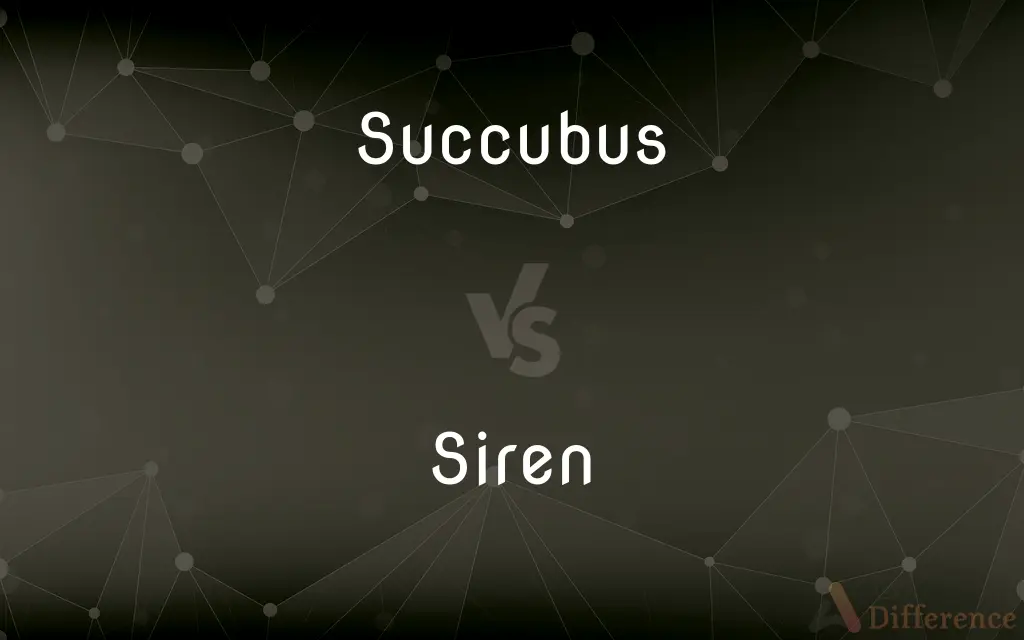Succubus vs. Siren — What's the Difference?
By Tayyaba Rehman & Fiza Rafique — Updated on March 26, 2024
A succubus is a demon from folklore that seduces men, usually in dreams, while a siren is a mythological creature that lures sailors with its enchanting music or voice.

Difference Between Succubus and Siren
Table of Contents
ADVERTISEMENT
Key Differences
A succubus is a demon originating from medieval European folklore, believed to seduce men in their sleep. According to legend, a succubus drains the life force from men, often leading to deteriorating health or even death. Sirens, on the other hand, hail from Greek mythology and are known for their irresistible song that lured sailors to their doom. Unlike the succubus, which interacts directly with its victims in a very personal manner, sirens are often described as impersonal forces of nature.
While both the succubus and the siren use seduction as their primary weapon, the context and method of their allure differ significantly. Succubi operate in the realm of dreams and nightmares, engaging directly with individuals, whereas sirens embody the dangers of the unknown, symbolizing the perils sailors face at sea.
The succubus's goal is typically to drain the life force or energy from their victims, often returning night after night to weaken their prey gradually. Sirens, however, seem to have no other aim than to draw sailors to their death, functioning more as symbolic representations of temptation and the destructive power of nature.
Culturally, the succubus and siren have left distinct marks on literature and art. The succubus is often explored in themes involving forbidden desires and the dangers of unchecked lust, while the siren has influenced countless works depicting the allure and peril of the unknown, particularly in narratives involving the sea.
Comparison Chart
Origin
Medieval European folklore.
Greek mythology.
ADVERTISEMENT
Nature
Demonic.
Mythological creature.
Method
Seduces men in dreams to drain life force.
Lures sailors with enchanting music or voice to their death.
Depiction
Often as an alluring woman.
Originally as part bird, part woman; later as mermaid-like figures.
Symbolism
Unchecked lust, manipulation.
Temptation, dangers of the sea/nature.
Interaction
Direct and personal.
Impersonal, embodying natural peril.
Goal
To drain life force or energy.
To lure to doom, without a clear reason beyond the act itself.
Cultural Impact
Explored in themes of forbidden desire.
Influences narratives of allure and peril.
Compare with Definitions
Succubus
Known for draining life force.
Victims of the succubus often experience unexplained fatigue.
Siren
Symbolizes the danger of the sea.
To the ancient Greeks, sirens represented the deadly allure of the ocean.
Succubus
Explored in themes of temptation and danger.
The succubus in the film symbolized the perils of lust.
Siren
Mythological creature that lures sailors with its song.
The sailors covered their ears to resist the siren's call.
Succubus
A demon that seduces men in their sleep.
He dreamed of a succubus visiting him at night.
Siren
Influences art and literature on temptation.
The poem depicted a siren luring a sailor to his doom.
Succubus
Appears in many horror and fantasy stories.
The novel featured a succubus as its main antagonist.
Siren
Depicted as part bird, part woman, or as mermaids.
The sculpture captured a siren with a bird's lower body.
Succubus
Often depicted in art as a beautiful woman.
The painting showed a succubus in a seductive pose.
Siren
Featured in many maritime legends.
Legends of sirens have haunted sailors for centuries.
Succubus
An evil spirit; a demon.
Siren
Greek Mythology One of a group of sea nymphs who by their sweet singing lured mariners to destruction on the rocks surrounding their island.
Succubus
A strumpet, whore or prostitute.
Siren
Siren A woman regarded as irresistibly alluring.
Succubus
The nightmare. See Nightmare, 2.
Siren
A device in which compressed air or steam is driven against a rotating perforated disk to create a loud, often wailing sound as a signal or warning.
Siren
An electronic device producing a similar sound as a signal or warning
A police car siren.
Siren
Any of several slender aquatic salamanders of the family Sirenidae of eastern North America, having external gills, small forelimbs, and no hind limbs.
Siren
(Greek mythology) One of a group of nymphs who lured mariners to their death on the rocks.
Siren
One who sings sweetly and charms.
Siren
A dangerously seductive woman.
Siren
(biology) A member of an order of mammals of Sirenia.
Siren
(biology) A member of a genus of aquatic salamanders of the family Sirenidae, commonly used for all species subsumed under the family of Sirenidae.
Siren
(entomology) Any of various nymphalid butterflies of the genus Hestina.
Siren
A device, either mechanical or electronic, that makes a piercingly loud sound as an alarm or signal, or the sound from such a device (first recorded 1879).
Siren
(music) A musical instrument, one of the few aerophones in the percussion section of the symphony orchestra (patented as Acme Siren in 1895).
Siren
An instrument for demonstrating the laws of beats and combination tones.
Siren
An astrophysical event that can be used for calculating cosmic distances.
Siren
To make a noise with, or as if with, a siren.
Siren
Relating to or like a siren.
Siren
One of three sea nymphs, - or, according to some writers, of two, - said to frequent an island near the coast of Italy, and to sing with such sweetness that they lured mariners to destruction.
Next where the sirens dwell you plow the seas;Their song is death, and makes destruction please.
Siren
An enticing, dangerous woman.
Siren
Something which is insidious or deceptive.
Consumption is a siren.
Siren
A mermaid.
Siren
Any long, slender amphibian of the genus Siren or family Sirenidæ, destitute of hind legs and pelvis, and having permanent external gills as well as lungs. They inhabit the swamps, lagoons, and ditches of the Southern United States. The more common species (Siren lacertina) is dull lead-gray in color, and becames two feet long.
Siren
An instrument for producing musical tones and for ascertaining the number of sound waves or vibrations per second which produce a note of a given pitch. The sounds are produced by a perforated rotating disk or disks. A form with two disks operated by steam or highly compressed air is used sounding an alarm to vessels in fog.
Siren
Of or pertaining to a siren; bewitching, like a siren; fascinating; alluring; as, a siren song.
Siren
A sea nymph (part woman and part bird) supposed to lure sailors to destruction on the rocks where the nymphs lived;
Odysseus ordered his crew to plug their ears so they would not hear the Siren's fatal song
Siren
A woman who is considered to be dangerously seductive
Siren
A warning signal that is a loud wailing sound
Siren
An acoustic device producing a loud often wailing sound as a signal or warning
Siren
Eel-like aquatic North American salamander with small forelimbs and no hind limbs; have permanent external gills
Common Curiosities
What is a succubus?
A succubus is a demon believed to seduce men in their sleep, draining their life force.
What is a siren?
A siren is a mythological creature that lures sailors to their doom with its enchanting music.
How do succubi and sirens differ in their methods?
Succubi seduce individuals in dreams, whereas sirens use their voices or music to lure victims.
Can succubi and sirens appear in physical form?
While succubi are said to visit in dreams, both entities are often depicted in art and literature as having physical forms.
What is the main goal of a succubus?
The main goal of a succubus is to drain the life force or energy from men.
Have modern interpretations changed how we view succubi and sirens?
Modern interpretations often explore these entities with more nuance, sometimes portraying them as misunderstood or complex characters.
Why do sirens lure sailors?
Sirens are symbolic, representing the perils of nature and the sea, with their luring of sailors more about embodying temptation and danger.
How have succubi and sirens influenced culture?
Succubi have influenced themes of desire and danger, while sirens have shaped narratives around the allure of the unknown and the sea's perils.
Do succubi and sirens exist in the same mythological world?
While they come from different cultural origins, both have been incorporated into a broader mythological and fantasy canon.
How do succubi interact with their victims?
Succubi interact directly and personally, often forming a parasitic relationship with their victims.
Are there male equivalents to succubi and sirens?
The male equivalent of a succubus is known as an incubus, while sirens have no direct male counterpart but share similarities with merfolk and other sea myths.
Can succubi and sirens be overcome or resisted?
Mythologies and stories suggest various means of resistance, from moral fortitude to physical barriers like wax in ears for sirens.
Are there historical accounts of encounters with succubi or sirens?
While there are no verified historical accounts, numerous legends, tales, and anecdotal stories persist, reflecting these creatures' enduring fascination.
What role do sirens play in Greek mythology?
Sirens in Greek mythology serve as a warning against the temptations that can lead to one's downfall.
Can succubi and sirens be considered evil?
They are traditionally seen as malevolent, but interpretations can vary widely, with some viewing them as embodying natural forces or consequences rather than evil per se.
Share Your Discovery

Previous Comparison
Duck vs. Dock
Next Comparison
Mayonnaise vs. ButterAuthor Spotlight
Written by
Tayyaba RehmanTayyaba Rehman is a distinguished writer, currently serving as a primary contributor to askdifference.com. As a researcher in semantics and etymology, Tayyaba's passion for the complexity of languages and their distinctions has found a perfect home on the platform. Tayyaba delves into the intricacies of language, distinguishing between commonly confused words and phrases, thereby providing clarity for readers worldwide.
Co-written by
Fiza RafiqueFiza Rafique is a skilled content writer at AskDifference.com, where she meticulously refines and enhances written pieces. Drawing from her vast editorial expertise, Fiza ensures clarity, accuracy, and precision in every article. Passionate about language, she continually seeks to elevate the quality of content for readers worldwide.
















































